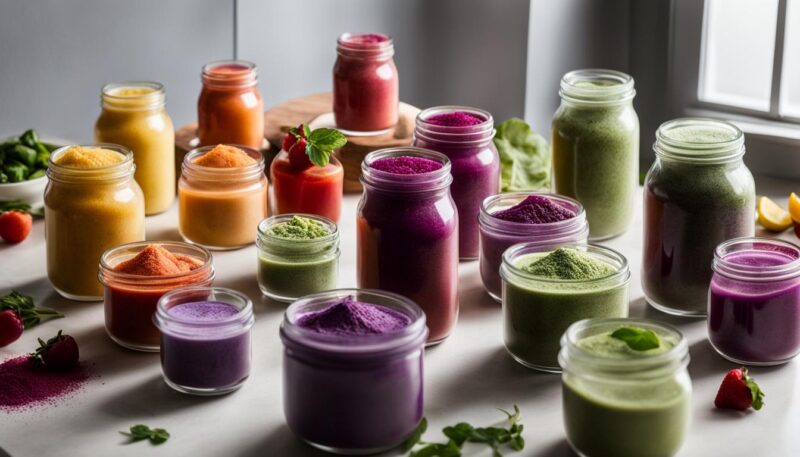Are you considering whey protein as a dietary supplement but wondering if it’s suitable for vegans? Let’s delve into the truth about whey protein, its impact on dairy consumption, and explore plant-based alternatives that might be more aligned with your vegan lifestyle.
- Whey protein is derived from cow’s milk and may not be suitable for vegans due to its animal-based source.
- Consuming whey protein can cause discomfort in individuals with dairy sensitivities, such as inflammation, bloating, and acne.
- Many whey protein powders contain artificial sweeteners, colors, and GMO ingredients.
- Consider the environmental impact of whey protein production, which relies on animal agriculture.
- There are several plant-based alternatives to whey protein that provide a complete source of protein without the negative effects and ethical concerns.
Understanding Whey Protein and its Origins
Whey protein is a by-product of the cheesemaking process and is derived from cow’s milk. It has a long history, with records dating back to ancient Greece and Rome. This protein supplement is currently a booming industry, valued at over $5.3 billion. However, it’s important to consider its origins and potential drawbacks.
The production of whey protein relies on animal agriculture, which raises concerns about the environmental impact and ethical considerations. Cow’s milk, the source of whey protein, can cause discomfort in individuals who are sensitive to dairy. Symptoms such as inflammation, bloating, digestive issues, acne, joint pain, headaches, and fatigue can be experienced by those with dairy sensitivity.
The Side Effects of Whey Protein
Whey protein, derived from cow’s milk, can have various side effects, particularly for individuals with dairy sensitivities. These side effects include inflammation, bloating, acne, joint pain, headaches, and fatigue. Many people are unaware that these symptoms may be caused by their whey protein consumption. It’s essential to be mindful of these potential side effects when considering whey protein as a dietary supplement.
Additionally, whey protein powders often contain artificial sweeteners, colors, and other additives, which can have negative health effects. These artificial ingredients may contribute to digestive issues and allergic reactions in some individuals. It’s important to read the labels and choose whey protein powders that are free from unnecessary additives to minimize the risk of experiencing these side effects.
Table: Common Side Effects of Whey Protein Consumption:
| Side Effects | Description |
|---|---|
| Inflammation | May cause inflammation in individuals with dairy sensitivities, leading to joint pain and discomfort. |
| Bloating | Can contribute to bloating and digestive issues, particularly in individuals with lactose intolerance. |
| Acne | May trigger acne breakouts in some individuals due to hormonal changes caused by dairy consumption. |
| Headaches | Can cause headaches and migraines in individuals who are sensitive to dairy or certain additives. |
| Fatigue | Some individuals may experience fatigue and lethargy as a result of consuming whey protein. |
It’s important to note that these side effects may vary from person to person. While some individuals may tolerate whey protein well, others might experience adverse reactions. It’s always recommended to consult with a healthcare professional or dietitian before incorporating any new dietary supplement, including whey protein, into your routine.
Vegan Alternatives to Whey Protein
If you’re looking for a vegan alternative to whey protein, you’re in luck. There are several plant-based protein powders available that can provide you with a complete source of protein without the negative effects of whey. Some popular options include:
- Pea Protein: Pea protein is derived from yellow split peas and is known for its high digestibility. It is also hypoallergenic, making it a suitable option for individuals with food sensitivities.
- Hemp Protein: Hemp protein is made from hemp seeds and is rich in healthy fats and fiber. It also contains all nine essential amino acids, making it a complete protein source.
- Rice Protein: Rice protein is derived from brown rice and is a suitable option for individuals with specific dietary restrictions or sensitivities. It is easily digestible and provides a good source of protein.
- Soy Protein: Soy protein is derived from soybeans and is a complete protein that contains all essential amino acids. It also provides essential minerals such as iron, calcium, and magnesium.
These vegan protein powders can be used as a direct substitute for whey protein in your diet. They can be easily incorporated into smoothies, shakes, or baked goods, providing you with the protein you need to support your fitness goals or maintain a balanced diet.
| Protein Powder | Key Features |
|---|---|
| Pea Protein | High digestibility, hypoallergenic |
| Hemp Protein | Rich in healthy fats and fiber, complete protein |
| Rice Protein | Easily digestible, suitable for dietary restrictions |
| Soy Protein | Complete protein, rich in essential minerals |
Plant-based protein powders offer a wide range of options for those seeking vegan-friendly alternatives to whey protein.
Whether you’re following a vegan lifestyle or simply looking for a dairy-free protein option, these plant-based protein powders can meet your nutritional needs. They not only provide a complete source of protein but also offer additional health benefits such as increased fiber intake and reduced saturated fat consumption. So, why not give them a try and experience the benefits of plant-based protein for yourself?

Factors Influencing Taste of Vegan Protein Powders:
- Source of protein (pea, hemp, rice, soy)
- Flavorings used (vanilla, chocolate, berry, etc.)
- Overall formulation of the powder
- Personal taste preferences
Experimenting with different brands and flavors is key to finding a vegan protein powder that suits your taste buds. What tastes great for one person may not be the same for another, so it’s important to consider personal preferences and seek recommendations from trusted sources. By exploring the variety of vegan protein powders available on the market, individuals can find a delicious and nutritious option to support their fitness and dietary goals.
Tips for Choosing Vegan Protein Powders
When it comes to choosing a vegan protein powder, there are several factors to consider. By taking these factors into account, you can ensure that you are selecting a high-quality product that meets your dietary and ethical needs.
Multi-Sourced Powders
One important factor to consider when choosing a vegan protein powder is whether it is multi-sourced. Multi-sourced powders combine various plant protein sources to provide a complete amino acid profile. This ensures that you are getting all the essential amino acids your body needs for optimal health and muscle recovery. Look for protein powders that include a blend of proteins such as pea, hemp, rice, and soy to ensure a diverse nutrient profile.
Low Sugar Content
It’s also crucial to pay attention to the sugar content of vegan protein powders. Some powders can be loaded with added sugars, which can lead to spikes in blood sugar levels and have negative effects on overall health. Opt for powders that are low in sugar or do not contain added sugars. Natural sweeteners such as stevia or monk fruit extract can be good alternatives to traditional sugars.
U.S. and Canada Sourced
Another aspect to consider is the sourcing of the protein powder. Choosing powders that are sourced from the U.S. and Canada can ensure quality and support local farmers. These regions often have stricter regulations and standards for food production, giving you peace of mind that you are consuming a safe and reliable product.
Organic Ingredients
Lastly, considering the use of organic ingredients in your vegan protein powder is a wise choice. Organic ingredients are grown without the use of synthetic pesticides or herbicides, which can be harmful to both the environment and human health. By opting for organic powders, you minimize your exposure to these potentially harmful substances and contribute to a more sustainable and eco-friendly food system.
Keep these tips in mind when choosing a vegan protein powder, and you’ll be on your way to finding a high-quality product that aligns with your dietary and ethical values.
| Factors to Consider | Details |
|---|---|
| Multi-Sourced Powders | Choose powders that include a blend of proteins like pea, hemp, rice, and soy to ensure a complete amino acid profile. |
| Low Sugar Content | Opt for powders that are low in sugar or do not contain added sugars to avoid negative effects on blood sugar levels. |
| U.S. and Canada Sourced | Select powders that are sourced from the U.S. and Canada to ensure quality and support local farmers. |
| Organic Ingredients | Consider powders made with organic ingredients to minimize exposure to synthetic pesticides and herbicides. |
Conclusion
In conclusion, whey protein is not suitable for vegans and can cause discomfort in individuals with dairy sensitivities. The production of whey protein relies on animal agriculture, which has significant ethical and environmental implications. Fortunately, there are several plant-based alternatives to whey protein that provide a complete source of protein without the negative side effects.
Vegan alternatives like pea protein, hemp protein, rice protein, and soy protein offer a wide range of options for those seeking plant-based protein options. These protein powders are not only nutritionally comparable to whey protein but also address the ethical concerns associated with animal agriculture. By choosing vegan protein powders, individuals can meet their protein needs while aligning with their dietary and environmental values.
When selecting vegan protein powders, it’s important to consider factors such as taste, ingredients, and sustainability. Personal preferences may vary, so it may be necessary to try different brands and flavors to find the one that suits individual preferences. Additionally, opting for powders that are low in sugar, multi-sourced, and sourced from the U.S. and Canada can ensure quality and support local farmers. By making informed choices, individuals can enjoy the benefits of plant-based protein powders while minimizing their environmental impact.
FAQ
Is whey protein suitable for vegans?
No, whey protein is derived from cow’s milk and is not suitable for vegans.
What are the side effects of whey protein?
Whey protein can cause inflammation, bloating, digestive issues, acne, joint pain, headaches, and fatigue in individuals with dairy sensitivity.
What are some vegan alternatives to whey protein?
Some vegan alternatives to whey protein include pea protein, hemp protein, rice protein, and soy protein.
Are whey protein and plant protein equally effective?
Yes, scientific studies have shown that both whey and plant protein are equally effective in supporting muscle growth and improving body composition.
How do vegan protein powders taste?
The taste of vegan protein powders can vary depending on factors such as the protein source, flavorings used, and overall formulation.
What should I consider when choosing a vegan protein powder?
It’s important to choose powders that are multi-sourced, low in sugar, high in dietary fiber, sourced from the U.S. and Canada, and consider organic ingredients.

